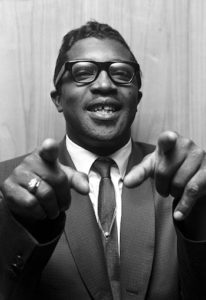
Bo Diddley
Bo Diddley, a Black blues musician, was born on this date in 1928.
Ellas Otha Bates McDaniel was born on a small farm near the town of McComb, MS, in rural Pike County, close to the Louisiana border. At eight months of age, he was the only child of Ethel and went to live with his mother's cousin, Gussie McDaniel, who raised him.
The family moved to Chicago when young Ellas was 6 or 7. In the Windy City, he got the name Bo Diddley from the kids at Willard Elementary School. As a child, he studied violin and taught himself how to play the guitar. As a young adult, he earned money performing odd jobs in construction and as a semi-pro boxer.
He took up blues and R&B after hearing John Lee Hooker. In the early '50s, he began playing with his longtime partner, maraca player Jerome Green, to get what Diddley called “that freight train sound.” Billy Boy Arnold, the blues harmonica player and singer, was playing with Diddley when he got a deal with Chess (after being turned down by rival Chicago label Vee-Jay). His first single, Bo Diddley/I'm a Man 1955, was a double-sided hit. The A-side had futuristic waves of tremolo guitar, set to a timeless nursery rhyme; the B-side had a bump-and-grind, harmonica-driven shuffle based around an overwhelming blues riff. The result was a new kind of guitar-based rock & roll, saturated in the blues and R&B but loyal to neither.
Diddley produced more influential music than all but a handful of the best early rockers. Diddley's spellbinding rhythmic attack and booming vocals stretched back to Africa for their roots and looked as far into the future as rap. His trademark otherworldly vibrating, fuzzy guitar style expanded the instrument's power and range. Diddley’s bounce epitomizes rock & roll at its most humorously outlandish and freewheeling. The Bo Diddley beat is one of rock & roll's bedrock rhythms, showing up in the work of Buddy Holly, the Rolling Stones, and even pop-garage knock-offs like the Strangeloves' 1965 hit "I Want Candy."
Diddley was never a top seller like Chuck Berry, but he produced a catalog of classics that rivaled Berry's in quality. "You Don't Love Me," "Diddley Daddy," "Pretty Thing," "Diddy Wah Diddy," "Who Do You Love?," "Mona," "Road Runner," "You Can't Judge a Book by Its Cover." All are standards. Oddly enough, his only Top 20 pop hit was an atypical, absurd back-and-forth rap between him and Jerome Green, Say, Man, almost accidentally while fooling around in the studio.
On stage, Diddley was great, using his trademark square guitars and distorted amplification to produce new sounds that preceded the innovations of guitarists like Jimi Hendrix. In Great Britain, he was revered as a giant on the order of Berry and Muddy Waters. The Rolling Stones, in particular, borrowed a lot from Diddley’s rhythms and attitude in their early days, although they only officially covered a couple of his tunes, "Mona" and "I'm Alright." Other British R&B groups like the Yardbirds, Animals, and Pretty Things also covered Diddley standards in their early days. Buddy Holly covered “Bo Diddley” and used a modified Bo Diddley beat on “Not Fade Away.” When the Stones gave the song the full-on Diddley treatment (complete with shaking maracas), the result was their first big British hit.
After 1963, he recorded less and less, and his writing or recording material was never on par with his early classics. In 1979, he toured with the Clash and had a cameo role in the film Trading Places." His other accomplishments include induction into the Rock and Roll Hall of Fame in 1987, a late-'80s tour with Ronnie Wood, and a 1989 television commercial for sports shoes with star athlete Bo Jackson. That same year, he got a star on the Hollywood Hall of Fame sidewalk.
Diddley was a well-respected artist who played a concert for President John Kennedy and Jacquie Kennedy. He also played at President Bush's Inaugural Gala in Washington, D.C., and performed at the Democratic National Convention for Bill Clinton. He received the Lifetime Achievement Award from the Rhythm and Blues Foundation at the Seventh Annual Pioneer Awards in 1996. He released "Road Runner Live" in February 1999.
Bo Diddley's career spanned more than five decades. Even toward the end of his career, he performed concerts in places like Robinsonville, MS, and Tokyo, Japan.
On May 17, 2007, Diddley was admitted to intensive care at Creighton University Medical Center in Omaha, NE, following a stroke during a concert at Council Bluffs, IA. Tests indicated that the stroke affected the left side of his brain, impairing his speech and speech recognition. A spokeswoman said that Diddley was in "guarded" condition. While recovering, he returned to his hometown to unveil a plaque devoted to him on the National Blues Trail. Bo Diddley died on June 2, 2008, of heart failure at his home in Archer, Florida.
Heart & Soul:
A Celebration of Black Music Style in America, 1930-1975
by Merlis Davin Seay, Foreword by Etta James
Copyright 2002, Billboard Books
ISBN 0-8230-8314-4